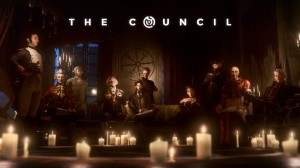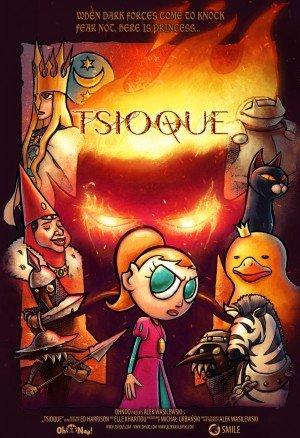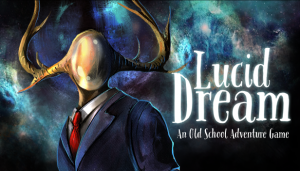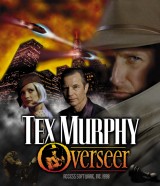Review for The Council page t
Game information
Adventure Gamers Awards
Big Bad Wolf’s ambitious 18th century adventure/role-playing game The Council certainly sounds good on paper: combine some of the best elements of traditional adventure games (dialogue and exploration) and RPGs (skill leveling and character progression), mix them up and toss them inside a sinister murder mystery filled with real-life individuals from history. While everything starts out on the right foot, however, the five-part series unfortunately can’t build on that early momentum. As interesting as it is to focus on your chosen abilities, sometimes it feels like none of it really matters, and though the story contains some compelling twists, in between it can start to drag through extended exposition that really stalls the pace. There are definitely some things that The Council gets right, particularly its world-building and intriguing dialogue mechanics, but the missteps are simply too numerous to ignore.
Set in 1793, players assume the role of Louis de Richet, a young Frenchman and secret society member who's searching for his missing mother. Sarah de Richet was last seen visiting Lord Mortimer at his foreboding island estate, but she's since vanished. Although the staff has searched the island from top to bottom (or so they claim), they can't find a trace of her anywhere, apart from a few things she left behind to suggest she’s in hiding. Determined to unravel the mystery behind his mother's sudden disappearance, Louis accepts an invitation to the next grand party being thrown by the English aristocrat, where he encounters several prestigious historical figures (including a duchess, a cardinal, and even George Washington and Napoleon Bonaparte) at the sprawling manor. The more Louis explores the grounds and interacts with its inhabitants – each of whom seems to hide a secret – the deeper the rabbit hole goes.
A month before all this happens, The Council's prologue in Paris offers a hint of what's to come and how your decisions will have long-lasting effects on the protagonist and those around him. While tied up alongside his mother by a mutual adversary, Louis manages to break free. You then get presented with two choices: make a bold move against your foe or allow Sarah to handle the confrontation. One path leads to a clean getaway, while the other leaves Louis with a permanent memento of his violent encounter. This small scenario shows that your actions can and will have tangible consequences on the story. While some are only cosmetic, others push Louis down alternate narrative paths that present entirely different choices.
Once you arrive on the island, you have the opportunity to select between three different professions: diplomat, occultist, and detective. While the diplomat will have a much easier time navigating conversations than the occultist and, to a degree, the detective, he'll struggle when it comes to identifying other languages and unraveling scientific mysteries. The detective, meanwhile, will pick up on specific mannerisms and find ways to exploit the weaknesses of those around him. Depending on which skill set you select, you'll find yourself locked out of specific sections of the game, requiring a whole new playthrough if you're eager to thoroughly explore the story.
The next layer of role-playing involves the talents within each chosen profession that you can spend accrued points on, which focus your areas of expertise further. This expands the possibilities once again, and you may find it worth going back and replaying an episode (or the entire game) from one or more different angles, especially if you feel you've missed an important piece of the narrative puzzle during your first experience.
The Council truly shines when you find yourself embroiled in confrontations, which require you to chat up a particular character in order to move the story forward. In one instance, Louis needs to convince someone to hand over a letter addressed to his missing mother. You can choose from a number of different responses, including a few that require Louis to utilize his special skills. Sometimes you won't have access to a certain option, given your choice of profession and skill levels, so you'll have to read your "opponent" and select the right choice based on his or her personality. If you decide to get snarky about religion when talking to a man of the cloth, Louis might have a difficult time winning him over. These encounters aren't too difficult, and the game allows you to make a handful of wrong choices before the entire conversation restarts, so those worried about possible "game over" screens can breathe easy.
Although you'll spend most of the game engaged in discussion, there are times when you'll get to explore Lord Mortimer's sprawling estate, which you'll navigate using the WASD keys and mouse (or a gamepad if you prefer). Clicking on other characters and interactive objects (highlighted by vague white orbs that come into focus when you draw near) will usually bring up a list of options, some of which are also dependent on Louis's current abilities. For example, the detective won't have access to a locked section of the wharf unless he finds a key, but the occultist can pick the lock and venture forward.
Using skills to perform actions spends effort points (the higher the skill level, the lower the point cost), which you can replenish using vials of jelly – a strange substance that our hero somehow knows will help him – hidden around the manor. But be careful: consuming too much jelly or other collectible power-ups that make using skills easier will have consequences, requiring the use of something called a Golden Elixir to correct. Knowing when to save your skill points and when to spend them requires a bit of strategy, especially when you're out of jelly.
Confused? Don't be. While The Council presents a number of different rules and systems, the game does a wonderful job explaining what you need to know in detail. By the time the first episode wraps up, you should have a solid grasp of how everything works. And if you don't, you can always settle in for another go-around to explore other avenues and be sure you’re ready to proceed. Since you can’t solve certain puzzles without possessing the requisite skills – deciphering a foreign language or identifying an individual without having knowledge of politics, for instance – tackling the story from different perspectives is the only way to get the most out of what this game has to offer. The episodes typically take roughly 2-3 hours each to complete the first time through, so replaying won't devour a large portion of your time. You also have the option of reloading specific chapters within an episode if you want to revisit something in particular.
Although the opening installment, “The Mad Ones,” does a fine job of introducing you to the various elements, unfortunately you’ll soon discover that a lot of these systems don’t seem to matter in the long run. The second episode in particular, “Hide and Seek,” plays out more like a traditional adventure game that doesn’t require the skills you’ve spent a fair amount of time fussing over. One puzzle forces Louis to decipher a date in order to access a secret room. Although using your skills can prompt Louis to provide a few hints, you’ll need to use your own smarts to actually overcome the obstacle. While I had absolutely no issue being required to solve this and other hit-and-miss puzzles on occasion, it felt entirely counterintuitive. If you’ve made the most logical choices in your area of expertise, why not allow Louis to crack the code using the skills he’s learned and enhanced? It seems pointless to build up relevant skills when you’ll need to solve things the same way regardless of your approach. It's as though the whole episode’s puzzles were designed without taking the RPG aspect into consideration. They seem to exist outside the core mechanics previously established, making the gameplay feel disconnected from everything that had come before. It's a pretty big misstep.
Perhaps the developers realized they’d veered too far off course, as things improve in Episode 3 (“Ripples”) and Episode 4 (“Burning Bridges”), both of which allow you to put Louis's skills to good use. However, while “Ripples” pushes the story in some interesting directions, including some compelling confrontations, genuinely entertaining puzzles, and amusing interactions with the game's cast of quirky characters, “Burning Bridges” kind of derails the energy generated by its predecessor. The penultimate chapter isn’t particularly bad, just a little boring as it plods along without any real enthusiasm for the suspenseful tale it's trying to create. Sure, the cliffhanger sets up a rousing final act, but it's tacked onto the end of a very lackluster few hours, which makes it difficult to really care about what's about to go down just when it should matter most.
And that’s a problem you’ll encounter throughout The Council: sometimes the game doesn’t have a whole lot to say despite the mountains of dialogue the characters tend to spew. The murder mystery and secret society storylines definitely have potential, but they're wrapped up in a lot of unnecessary plot points that often feel extraneous. By the time you reach the final episode, you’ll wish that the writers had trimmed the proverbial fat and made their adventure a leaner, well-paced eight-hour game as opposed to an extended episodic affair. As it stands, the overall narrative feels like an extended cut of a movie that could have benefited from some much-needed time in the editing room.
Even with the game’s unevenness to that point, I’d hoped that The Council could at least stick the landing. Despite tempering my expectations, however, “Checkmate” arrived with a resounding thud. Sure, the conclusion tosses around some mildly intriguing twists, but not only are you funneled toward a predetermined conclusion regardless of the choices you’ve made, the story ends up thrusting poor Louis into a series of choices that seem out of character. It’s difficult to describe without spoiling anything, but suffice it to say that when one of the characters transforms into a villain without much warning, Louis really has no choice but to change his plans. If you’ve taken the time to play Louis as a proper character, as opposed to simply an avatar in a game, this will force you down one particular path that can completely transform his carefully cultivated personality with a few questionable decisions. This definitely wasn’t the ending I’d hoped the series would deliver.
Graphically the game is a bit of a mixed bag as well. Although the creepy island manor contains tons of iconic artwork from a number of famous painters, as well as exquisite furniture and lush decorations appropriate to the era, some of characters themselves are a little odd. While Louis looks fantastic, his poor mother looks like a hellish mix of Angela Lansbury and some sort of mythical bird-woman with terrible skin. George Washington also suffers, though poor Sarah de Richet easily provides the most unintentional scares. The textures throughout hit a lot of high notes – the gallery is truly a sight to behold and the manor’s halls are adorned with intricately crafted rugs and glistening marble tile – so it's a shame that some character models are so noticeably less appealing than others. They're not horrible, mind you, but the oddballs definitely seem a little jarring when standing next to their sharper counterparts. The animation serves its purpose but it too has a few moments of unexpected wonkiness when characters move like waxwork statutes brought to life. At times I found myself paying more attention to their repulsiveness than the dialogue.
To make matters worse, the voice acting frequently sounds stilted and a little goofy, and at times the actors seem miscast. Louis certainly doesn't sound French, and his reaction to a number of situations provides a few misplaced laughs. Unfortunately, you'll have to listen to him prattle on about anything and everything, making his voice work more than a little irritating as the game wears on. Since Big Bad Wolf built The Council around intense conversations, casting an actor who could handle the more dramatic moments would have strengthened the overall experience considerably. Again, the performance doesn't scrape the bottom of the proverbial barrel, but it weakens many of the exciting scenes somewhat. For all his efforts to prove otherwise, I just don't buy Louis as a tough guy. And then there are the technical audio issues, including poor lip syncing and moments of dead audio before a character speaks.
The Council makes a great first impression, setting the stage for a thrilling narrative role-playing experience in the early going by introducing the systems, characters, and depth you hope will develop with each passing episode. From the investigation of Sarah de Richet’s disappearance to the promise of shady dealings of a secret organization known as the Golden Order, there are some appealing ideas here for long-time adventurers who want something different from the genre. Sadly, despite some interesting twists in the story, this five-part series simply sports way too many blemishes and missed opportunities as it goes along to really pull off such an ambitious endeavor. Big Bad Wolf has the right idea, but the role-playing elements often feel like a gimmick shoehorned into a mystery that might have been stronger without them. I’d love to play a game that can seamlessly blend traditional adventuring with some well-developed RPG systems, but the longer I played, the more I realized that The Council just couldn’t bring these two worlds together to fulfill its early promise.































